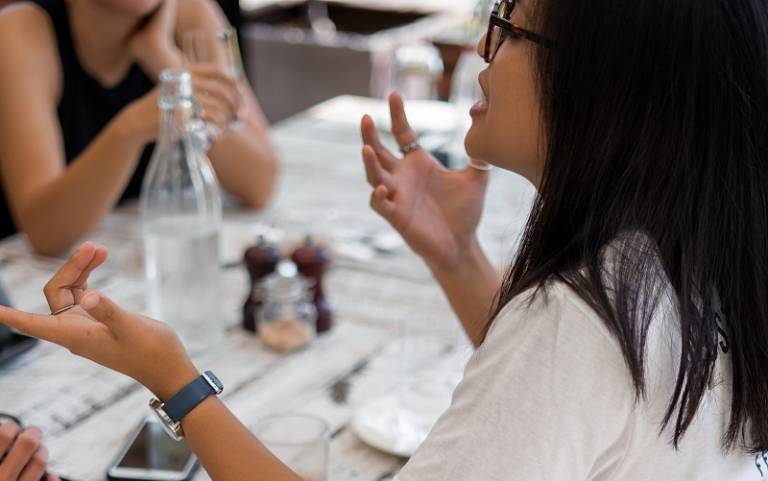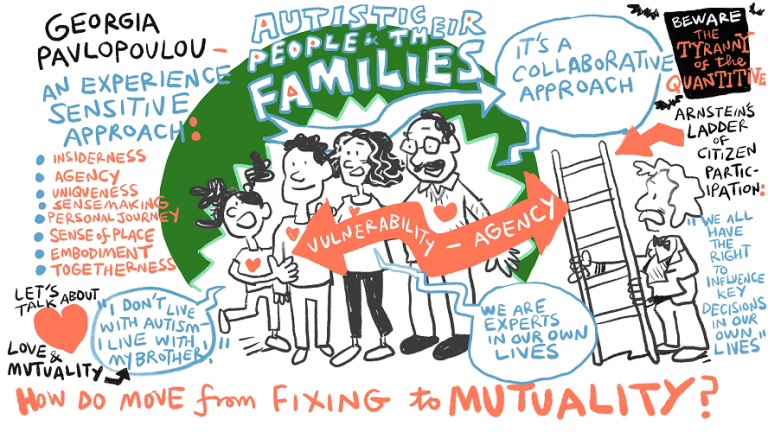Ground-breaking interdisciplinary research festival dispels the myths of autism
17 June 2021
A new festival led by UCL Institute of Education (IOE), the University of Kent and the University of Leeds has given voice to topics that are rarely heard in current conversations about autism.

Taking place between 19 and 21 May 2021, the autistic-led festival explored creative ethical and methodological approaches to autism research by focusing on insider experiences, social relationships and the arts. More than 600 people attended over the three days and they were able to freely access 12 panels, four workshops, two film screenings and take part in 12 Q&A sessions. It was organised by Dr Georgia Pavlopoulou (IOE and UCL’s Flock Unlocked Collective), Dr Damian Milton (University of Kent and Participatory Autism Research Collective) and Dr Anna Stenning (University of Leeds), and was funded by the Wellcome Trust and the John and Lorna Wing Foundation.
The festival had more than 30 speakers, many of whom identify as autistic or otherwise neurodivergent or disabled. The events were designed to be accessible to autistic and multiply disabled audience members, with British Sign Language and closed captions used throughout.
During the festival, panellists worked together across neurological and disciplinary divides to examine how to improve mental health research, mental health outcomes and social inclusion for autistic people and their families. It aimed to address the barriers autistic people face in communicating the relevance of embodied cognitive difference more generally. In this way, the co-organisers intended to challenge the idea that there is one ‘central’ narrative that conveys the experience of autism. Importantly, the event aimed to dispel the myths that autistic people are not interested in the arts or social relationships.
During the event, participants shared ideas about participatory research, co-production, mental wellbeing, narrative research, families, creativity and representation in the context of autism. Alongside the expertise of Participatory Autism Research Collective (PARC), the Flow Unlocked artists, community members and researchers in different fields celebrated the achievements of the second stage in the Flow Unlocked project funded by UCL Culture, which explores autistic adults' relationships and wellbeing.

Dr Anna Stenning, a Wellcome Trust Fellow based in the School of English at the University of Leeds, said:
“We would like to see this as the first stage towards research events that are run by and for autistic people, and which celebrate the cultural contributions of our community. Many autistic people who took part said that for the first time they felt that being autistic was actually an advantage. For me personally, the event showed the potential for online events to create new communities; it demonstrated the creativity and knowledge of autistic people and it demonstrated the need for broader change away from a deficits-based model.”
Dr Pavlopoulou said:
"Something is missing in contemporary health and social care. Health and illness are often measured in policy documents in economic terms, and clinical outcomes are enmeshed in statistical data. The festival had an explicit social disability shared ethos, contributing to a move towards new ways of thinking about autism research that do not rely on existing ‘deficit-based’ narratives. I am deeply touched by the conviction and enthusiasm of all participants to showcase the power of creative arts in research and the need to de-medicalise autistic existence and humanise autism research.”
Dr Milton added:
“The IARF event was a huge success and has come about through much continuing effort within an ever-broadening neurodivergent culture. The quality and diversity of presentations and feelings of connection and solidarity for many participating, show the value of such events and sends a clear message to all those who claim their aims and practices are for the benefit of autistic people, yet all too often fall below that ideal.”
Links
- Dr Anna Stenning on autistic life writing
- Dr Pavlopoulou on Flow Unlocked creative collective funded by UCL Culture
- Dr Milton on why autistic people are often misunderstood
- UCL Group for Research in Relationships and NeuroDiversity
Images
Top image: Jessica Da Rosa on Unsplash
Above image: Drawing by Joshua Knowles, commissioned by IAR Festival team to capture moments of the festival.
 Close
Close

